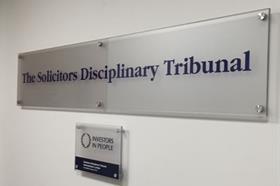A former law firm partner who asked another solicitors firm to agree to amend a date has been struck off the roll.

Aymer Hutton, who practised with Essex firm Cunningtons LLP, phoned and then emailed the other firm after his conveyancing client had missed out on the stamp duty holiday.
The Solicitors Disciplinary Tribunal heard that Hutton had expected the matter to complete by 30 June 2021 and so save his client an estimated £6,000. But the completion actually took place on 1 July when funds were sent and received, meaning the stamp duty headline was missed.
He phoned the other firm involved in the transaction, asking its secretary to backdate the transfer form so his client could still benefit. She escalated the matter to a fee earner with the note ‘no – not prepared to lie for him’.
Hutton then sent an email to the fee earner from the other firm asking her to agree to the date change, saying: ‘Our clients do not have funds and so you can imagine we would like to avoid a claim. We paid your costs and late interest and hope please that in the circumstances the date can remain the 30 June.’
The other firm reiterated it would not backdate any document and pointed out that Hutton’s conduct was potentially dishonest. The matter was reported to the SRA.
Read more:
Hutton denied acting dishonestly, saying he was trying to give effect to the intentions of the parties, who wanted completion to take place on 30 June. He told the SRA this was a ‘clumsy and naïve’ attempt to deal with a delayed completion rather than an exercise in fraud. In hindsight, he accepted, it was inappropriate to ask the other side to date the contract differently.
The tribunal found Hutton’s actions were designed to avoid his client’s liability for stamp duty land tax. This liability would be likely to have been passed to the firm.
It was accepted that Hutton, who qualified as a solicitor in 1991, had a clear regulatory history and that he had made prompt admission and cooperated with the SRA. But this was not a direct answer to the allegations and the tribunal found dishonesty proved.
Hutton tried to argue in mitigation that this conduct had been an ‘isolated, discrete and momentary lapse’ lasting 30 minutes and involving one phone call and email. It had happened in the context of the busiest working day he had ever experienced due to the end of the stamp duty holiday.
The tribunal accepted his remorse to be sincere and genuine, but gave significant weight to the nature of the dishonesty which, if carried through, would have resulted in a deceit upon HMCR.
It added:’The integrity of the conveyancing process is founded upon the network of obligations which exist between the profession and others. There must be unshakeable confidence that solicitors will record accurately and discharge a liability to the Revenue as an integral part of that process.’
Hutton was struck off and agreed to pay £5,000 costs.






























